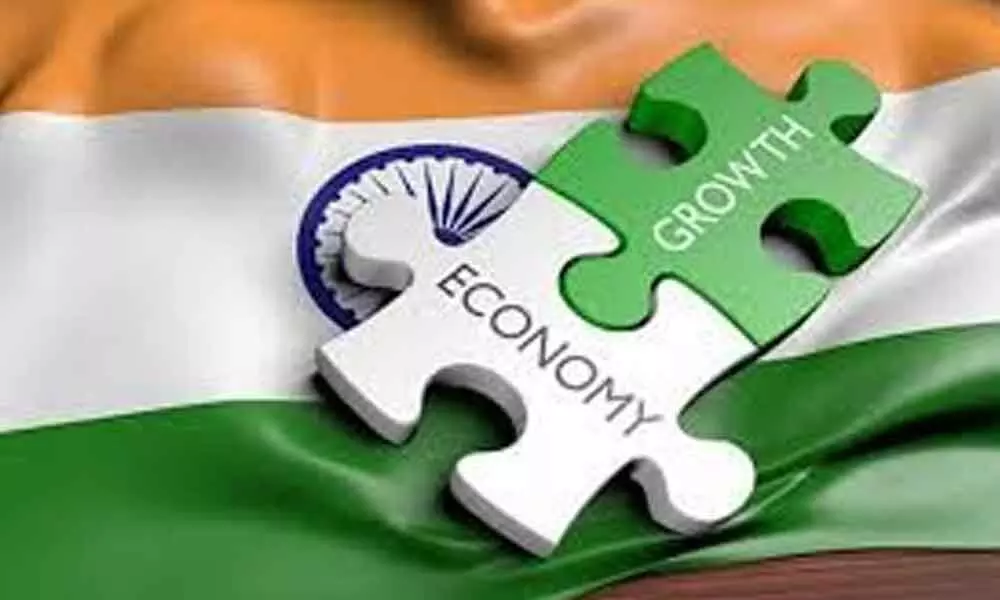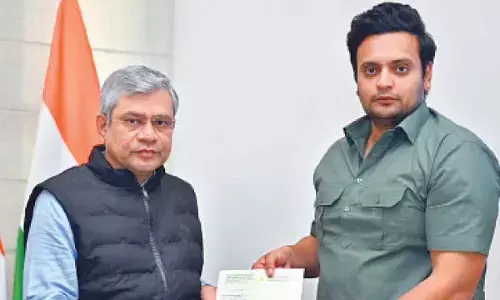Basic issues not solved

Representational Image
The Finance Minister has given a push to make in India.
The Finance Minister has given a push to make in India. The domestic procurement of defence sector has been increased from 58 per cent to 68 per cent and concessions have been given for items that are necessary for jumpstarting production in India. For example, imports of lenses for mobile phones have been made easier. Import duty has been increased on capital goods such as machinery, for which we have adequate capacity to manufacture in India. The same holds for chemicals. Import duty has been increased on certain chemicals that we can produce ourselves. Incentives have also been given to the manufacturer of solar panels. These policies are entirely in the right direction and the Finance Minister needs to be congratulated for taking these steps for promoting Make in India.
The basic problem of the Budget is that the same supply side policy that has led to slowdown of the economy in the last eight years of present government continues. The Finance Minister has provided for increased outlays on "Production Linked Incentive Scheme" and provided incentives to promote private investment. However, this will not be of any avail.
The fundamental calculation of a businessman is whether he or she can sell the goods in the market. If there is no demand in the market, then a businessman will not invest irrespective of whether she is entitled to income tax exemptions or Production Linked Incentives. Of what use are income tax incentives when there is no income? The budget is like providing incentives to potato growers to reach their potatoes to the market at a lower cost when there are no buyers for potatoes in the market. If the consumers do not have money in their pocket, it hardly matters to them whether the potatoes are available at Rs 20 a kilo or Rs 15 a kilo.
The Finance Minister has failed to deal with basic problem of lack of demand in the market. Demonetisation and GST have led to the collapse of small and medium industries and employment has collapsed. The Finance Minister has not made any discussion about how she proposes to provide employment to the large number of youths who are entering the market. No employment means no demand and there will be no demand in the market. The supply side incentives of income tax exemptions and Production Linked Incentives will be of no avail. The economy will continue in the slow lane as it has been continuing in the last seven years.
The Finance Minister has rightly claimed that the Government has implemented schemes for providing free gas cylinders and accessible electricity and such. However, such relief does not translate into market demand. The challenge was to reduce government consumption and shift it to people's consumption.
The Government is paying high salaries to its employees. These employees already have the money to buy their requirements of cloth, paper, and bulbs. They use their additional salaries to invest in share markets or to send it abroad. Whereas, if the same money were to be given to the poor people as cash transfers, then they would buy more of cloth and paper from the market and jumpstart the economy. The Finance Minister has totally ignored the fact that there is no demand in the market and hence the economy is likely to continue in the slow lane.
The Finance Minister has said the capital expenditures will be increased from 5.5 lakh crore to 7.5 lakh crore indicating an increase of 2 lakh crore. The total expenditures will increase from 34 to 39 lakh crore in the next year indicating an increase of 5 lakh crore. The increase in capital expenditure is substantial. However, it is still like a drop in the ocean.
The fact is that our economy it is being swamped by imports both of services and goods. People still use apps like Zoom and Camscanner that had been prohibited because we are not able to produce equivalent domestic apps. The need was to increase the capital expenditure from 5.5 to say 10.5 lakh crore and actually reduce the government consumption. That would have helped reduce the cost of production in the country. For example, free Wi-Fi could have been provided for all the small towns so that the youth can access the internet easily and export their services like online tuition, music or whatever. Such massive increase in investment in pro-poor infrastructure alone would help the people to compete in the global market of services. There has been nothing like this in the budget.
The Finance Minister has patted her back at the buoyant GST collections at 1.4 Lakh crore in a month which is indeed good. However, the question is that if collections have increased from 1.0 lakh crore to 1.4 lakh crore within a period of about one year, showing an increase of 40 per cent. then why the GDP has increased only at 9 per cent?
The reason is that most increase in GST collection is coming from the transfer of manufacturing from the informal to formal sector. The poor man who was selling peanuts on the road corner has lost his business and the same has been transferred to the big manufacturers who are selling packed peanuts The small street vendor was not paying GST. The big manufacturer is paying GST. Therefore, a transfer of production from the small to the big it involves increasing GST without an increase in production. This and this it is the reason that GST is buoyant. The Finance Minister has not taken any steps to protect the jobs and employment of the poor.
The last point is that the States will be lose the compensation of shortfall of GST beginning with July 2022. At this point, many States will see a decline in their revenue by 20 to 40 per cent. In order to help them overcome this situation, the Finance Minister has provided that they can take large amount of loans. But loans will not solve the problem at all. The States need to generate their incomes. Just as the deficit of GST the States was pushed from 2017 to 2022 by providing for compensation for shortfall; now the same deficit is being pushed by another few years by allowing States to borrow more money. This is like the Finance Minister providing loans to a person who is lost his job. How long will he survive on loans unless he can get a job?
The Finance Minister should have enabled the States to increase their income by allowing them to increase the rates of GST within their state borders. Without such a step, the States will not be able to earn the revenue today or five years later and the situation will only get worse.
(The author is former Professor of
Economics at IIM, Bengaluru)
(The opinions expressed in this column are those of the writer. The facts and opinions expressed here do not reflect the views of The Hans India)











